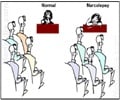At the Sleep and Breathing Conference in Berlin, organised by the European Respiratory Society and the European Sleep Research Society a new study will be presented.

The researchers used the Endicott Work Productivity Scale, a questionnaire designed to assess productivity at work, and the Epworth Sleepiness Scale, a globally accepted questionnaire which assesses daytime sleepiness. Included were 45 patients with sleep apnoea of working age (between 40 and 56 years), who completed the questionnaires at the outset and after 3 months of CPAP treatment.
The results showed that 35 of the patients who had good adherence to CPAP treatment showed significant improvement in their productivity at work and in their daytime sleepiness. The 10 patients who did not follow the treatment programme had no significant improvement in symptoms or work productivity.
Lead author, Evangelia Nena MD, PhD, said: "Continuous positive airway pressure (CPAP) is the gold standard treatment for moderate-to-severe obstructive sleep apnoea. Previous research has shown the potential benefits of CPAP to patients' health and quality of life and our findings add to this body of evidence, demonstrating the advantages the treatment can have on productivity at work."
Dan Smyth, Sleep Apnoea Europe, said: "This study underlines the positive benefits of compliant use of Continuous Positive Airway Pressure (CPAP) Treatment Therapy for Sleep Apnoea sufferers. It also confirms that the symptoms of the condition can be controlled and that the patient can remain an effective member of the workforce."
Source-Eurekalert















